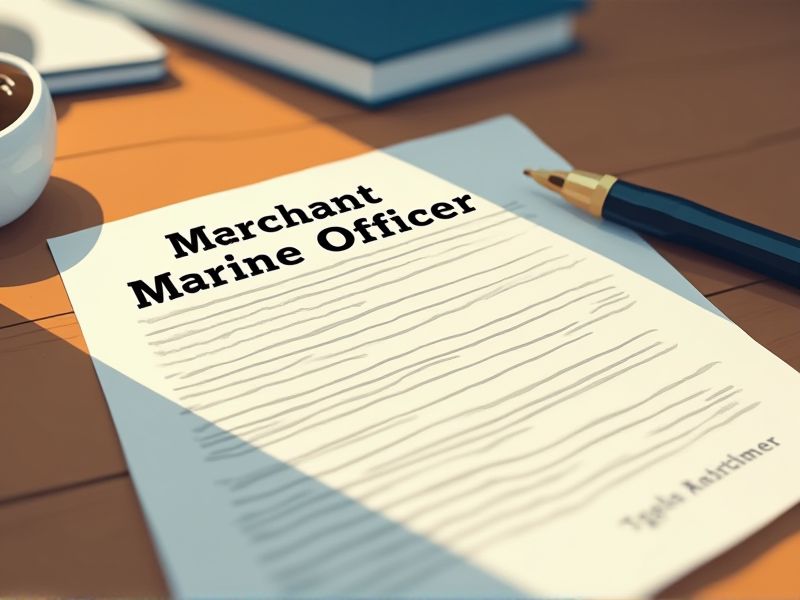
The maritime industry demands stringent safety and operational standards, influencing Merchant Marine Officers to obtain specific certifications. Complex international regulations and the unpredictable nature of marine environments necessitate rigorous training and documentation. Certifications ensure officers possess critical skills in navigation, safety management, and crisis response, thus safeguarding both lives and cargo. Here are some important certifications you might require as a Merchant Marine Officer.
Officer in Charge of a Navigational Watch (OICNW) Certificate
The OICNW Certificate is crucial for Merchant Marine Officers as it ensures they have the essential skills and knowledge to navigate a vessel safely and efficiently. It establishes a standardized level of competence, which aids in maintaining international maritime safety regulations. Holding this certification also enhances career opportunities, as it is often a prerequisite for advancing to higher-ranking positions within the maritime industry. The certificate supports global maritime operations by reducing the risk of navigational errors and incidents, contributing to overall marine safety.
Officer in Charge of a Marine Engineering Watch (OICMEW) Certificate
Possessing an Officer in Charge of a Marine Engineering Watch (OICMEW) Certificate signifies that a Merchant Marine Officer meets international standards for competency in marine engineering watch-keeping. The certificate helps ensure safety and operational efficiency on commercial ships by requiring officers to demonstrate expertise in maintaining and operating a vessel's engine and auxiliary equipment. Maritime laws and conventions necessitate that vessels adhere to safety regulations, and having certified officers onboard fulfills this legal obligation. The certificate enhances career prospects by validating an officer's qualifications and readiness for responsibility, potentially leading to promotions within the maritime industry.
STCW Basic Safety Training Certificate
The STCW Basic Safety Training Certificate is necessary for Merchant Marine Officers, as it ensures compliance with international maritime safety standards. Possessing this certification equips officers with essential safety skills such as fire prevention, firefighting, and emergency response, thereby minimizing the risk of onboard accidents. The certification also standardizes the competence levels among seafarers, facilitating smoother operations in multinational crews. Without this certification, officers may face restrictions on employment opportunities, limiting their ability to work on international vessels.
STCW Advanced Fire Fighting Certificate
The STCW Advanced Fire Fighting Certificate is essential for Merchant Marine Officers because it prepares them to handle onboard fire emergencies, potentially saving lives and property. Merchant vessels are confined spaces with flammable materials, making fire a significant risk; trained officers are necessary to effectively manage and extinguish such hazards. International regulations mandate this certification to ensure standard firefighting skills across global maritime operations. Without it, officers may lack crucial skills needed to maintain safety and comply with maritime standards.
STCW Medical First Aid Certificate
The STCW Medical First Aid Certificate ensures Merchant Marine Officers possess crucial skills for handling medical emergencies at sea, where immediate professional help isn't accessible. In high-stress scenarios, such knowledge can mitigate injuries and potentially save lives by providing timely and effective care. Employers prioritize officers with this certification, reflecting an adherence to international safety standards and legal obligations. Training in medical first aid directly correlates with enhanced crew safety and operational readiness during maritime voyages.
Bridge Resource Management (BRM) Certificate
Bridge Resource Management (BRM) training equips Merchant Marine Officers with essential skills in communication, teamwork, and decision-making critical for safe navigation. The globalization of maritime trade and the increasing complexity of vessel operations amplify the risk of human error, necessitating formal BRM certification. BRM emphasizes effective utilization of all available resources, thereby reducing incidents and enhancing situational awareness. Compliance with international maritime regulations often mandates BRM certification, underscoring its vital role in promoting maritime safety standards.
Engine Room Resource Management (ERRM) Certificate
Engine Room Resource Management (ERRM) Certificate is needed for Merchant Marine Officers to ensure they are equipped with essential teamwork and communication skills for operating engine rooms effectively. It provides specialized training to handle emergency situations, reducing the likelihood of human error-related incidents. The certificate is a compliance requirement under international maritime regulations, promoting standardized operation practices across various vessels. Possessing an ERRM certificate enhances professional credibility, enabling officers to pursue higher positions within the maritime industry.
Maritime English Certificate
The International Maritime Organization (IMO) mandates English proficiency to ensure effective communication in the diverse and multicultural maritime environment. A Maritime English Certificate enhances safety by minimizing misunderstandings during critical operations and emergencies. The certificate also boosts employability prospects, as many shipping companies require it as a prerequisite for officer roles. Clear communication facilitated by such certification reduces operational risks and contributes to more efficient vessel operations.
Global Maritime Distress and Safety System (GMDSS) Operator Certificate
The GMDSS Operator Certificate ensures that a Merchant Marine Officer is competent to handle communication equipment vital for maritime safety. This certification reduces the risk of communication failure during emergencies by verifying the officer's ability to operate distress signals and alerts. Regulatory compliance with international maritime conventions requires officers to possess such qualifications, thus maintaining global shipping safety standards. In emergency situations, the officer's ability to quickly initiate coordinated rescue operations directly relies on the expertise provided by the GMDSS certification.
Ship Security Officer (SSO) Certificate
The Ship Security Officer (SSO) Certificate is mandated due to international regulations that require specialized training for maintaining shipboard security protocols. This certification ensures that merchant marine officers are equipped to handle security threats, thereby enhancing the overall safety of maritime operations. Without an SSO Certificate, an officer may lack the specific knowledge to implement the Ship Security Plan effectively. Credentialing with an SSO Certificate is critical to comply with the International Ship and Port Facility Security (ISPS) Code requirements.
Summary
You, as a Merchant Marine Officer, can significantly enhance your career prospects by obtaining certifications. These credentials often lead to increased job opportunities and higher earning potential. Certifications can also expand your skill set, making you more competitive in the industry. Possessing these qualifications typically results in greater job security and professional recognition.
